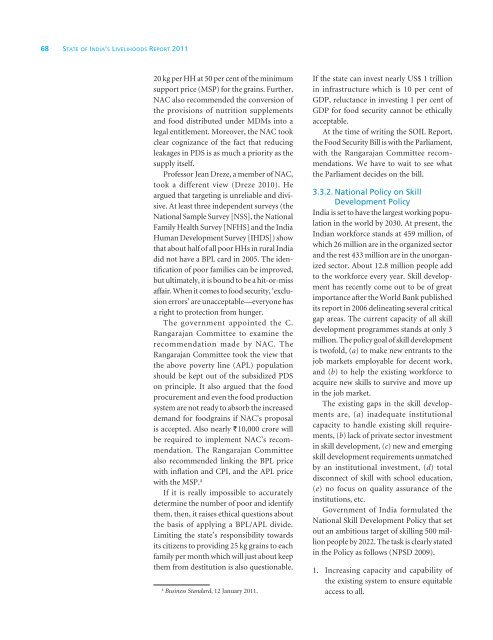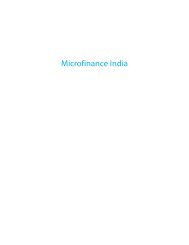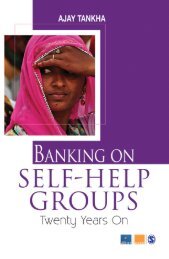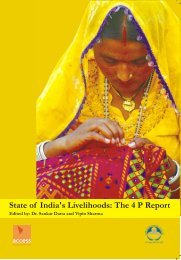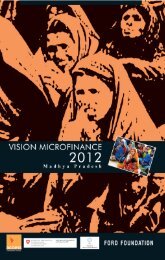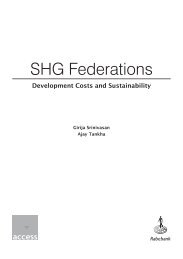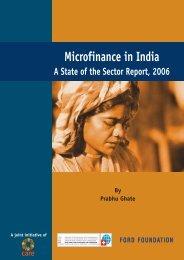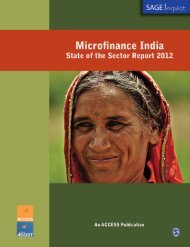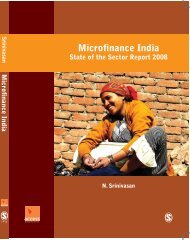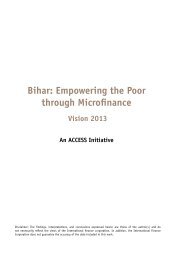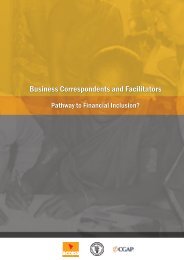SOIL Report 2011 - ACCESS Development Services
SOIL Report 2011 - ACCESS Development Services
SOIL Report 2011 - ACCESS Development Services
- No tags were found...
Create successful ePaper yourself
Turn your PDF publications into a flip-book with our unique Google optimized e-Paper software.
68 State of India’s Livelihoods <strong>Report</strong> <strong>2011</strong>20 kg per HH at 50 per cent of the minimumsupport price (MSP) for the grains. Further,NAC also recommended the conversion ofthe provisions of nutrition supplementsand food distributed under MDMs into alegal entitlement. Moreover, the NAC tookclear cognizance of the fact that reducingleakages in PDS is as much a priority as thesupply itself.Professor Jean Dreze, a member of NAC,took a different view (Dreze 2010). Heargued that targeting is unreliable and divisive.At least three independent surveys (theNational Sample Survey [NSS], the NationalFamily Health Survey [NFHS] and the IndiaHuman <strong>Development</strong> Survey [IHDS]) showthat about half of all poor HHs in rural Indiadid not have a BPL card in 2005. The identificationof poor families can be improved,but ultimately, it is bound to be a hit-or-missaffair. When it comes to food security, ‘exclusionerrors’ are unacceptable—everyone hasa right to protection from hunger.The government appointed the C.Rangarajan Committee to examine therecommendation made by NAC. TheRangarajan Committee took the view thatthe above poverty line (APL) populationshould be kept out of the subsidized PDSon principle. It also argued that the foodprocurement and even the food productionsystem are not ready to absorb the increaseddemand for foodgrains if NAC’s proposalis accepted. Also nearly `10,000 crore willbe required to implement NAC’s recommendation.The Rangarajan Committeealso recommended linking the BPL pricewith inflation and CPI, and the APL pricewith the MSP. 4If it is really impossible to accuratelydetermine the number of poor and identifythem, then, it raises ethical questions aboutthe basis of applying a BPL/APL divide.Limiting the state’s responsibility towardsits citizens to providing 25 kg grains to eachfamily per month which will just about keepthem from destitution is also questionable.4Business Standard, 12 January <strong>2011</strong>.If the state can invest nearly US$ 1 trillionin infrastructure which is 10 per cent ofGDP, reluctance in investing 1 per cent ofGDP for food security cannot be ethicallyacceptable.At the time of writing the <strong>SOIL</strong> <strong>Report</strong>,the Food Security Bill is with the Parliament,with the Rangarajan Committee recommendations.We have to wait to see whatthe Parliament decides on the bill.3.3.2. National Policy on Skill<strong>Development</strong> PolicyIndia is set to have the largest working populationin the world by 2030. At present, theIndian workforce stands at 459 million, ofwhich 26 million are in the organized sectorand the rest 433 million are in the unorganizedsector. About 12.8 million people addto the workforce every year. Skill developmenthas recently come out to be of greatimportance after the World Bank publishedits report in 2006 delineating several criticalgap areas. The current capacity of all skilldevelopment programmes stands at only 3million. The policy goal of skill developmentis twofold, (a) to make new entrants to thejob markets employable for decent work,and (b) to help the existing workforce toacquire new skills to survive and move upin the job market.The existing gaps in the skill developmentsare, (a) inadequate institutionalcapacity to handle existing skill requirements,(b) lack of private sector investmentin skill development, (c) new and emergingskill development requirements unmatchedby an institutional investment, (d) totaldisconnect of skill with school education,(e) no focus on quality assurance of theinstitutions, etc.Government of India formulated theNational Skill <strong>Development</strong> Policy that setout an ambitious target of skilling 500 millionpeople by 2022. The task is clearly statedin the Policy as follows (NPSD 2009).1. Increasing capacity and capability ofthe existing system to ensure equitableaccess to all.


